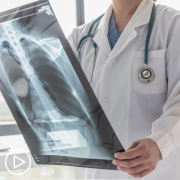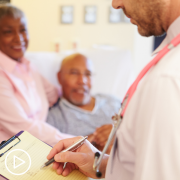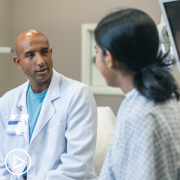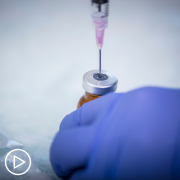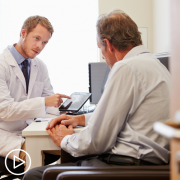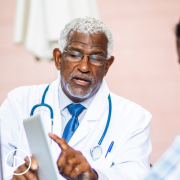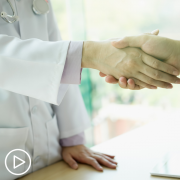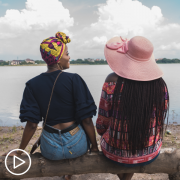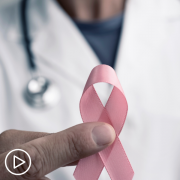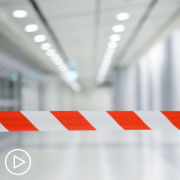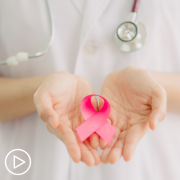How Can Myeloma Patients Take an Active Role in Their Treatment and Care?
How Can Myeloma Patients Take an Active Role in Their Treatment and Care? from Patient Empowerment Network on Vimeo.
Expert Dr. Rafael Fonseca explains shared decision-making, and encourages patients to take an active role in their care and treatment to aid in improved outcomes.
Dr. Rafael Fonseca is the interim director of Mayo Clinic Cancer Center and serves as the director for Innovation and Transformational Relationships at Mayo Clinic in Arizona. Learn more about Dr. Fonseca here.
Related Programs:
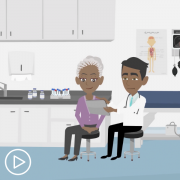
|

|
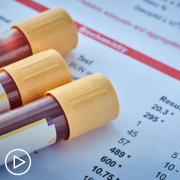
Myeloma Test Results and Factors That Impact Treatment Decisions |
Transcript:
Katherine:
Yeah. Lately, we’ve been hearing this term, “shared decision-making,” which basically means that patients and clinicians collaborate to make healthcare decisions, and it can help patients to take a more active role in their care.
I’d like to get your thoughts, Dr. Fonseca, on how best to make this process work.
Dr. Fonseca:
We are very fortunate to live in this time of medicine, where ultimately, we recognize that the patient is the person expert. It is the patient decisions that should drive what is to be done in a situation. Whenever I interact with patients, I tell them, “Listen, I’m going to be like your counselor. I will provide you with options of what I think is reasonable. I will go to different degrees of effort in trying to convince you one way or another for a particular intervention. But at the end of the day, I only do a good job if I present you with the options and the pros and cons of those various approaches.”
I weave that into my language on every single conversation we have with patients. I think we’re way past the time where a physician would come and say, “This is what you’re going to do,” or “This is what will happen.” My language always includes, “I would recommend this.”
“I think the next best step for you to consider would be X, Y, or Z.” But ultimately, I look at patients and not infrequently at the person next to them, a family member or a close friend, and I say, “You’re the boss and with the person next to you providing additional support, comment, and guidance, we can together reach the best decision of what should proceed.” I think we’re incredibly fortunate because patients have access to sophisticated information, especially patients that have serious conditions such as would be cancer and, in my case, myeloma.
As an example, when I work with general internal medicine residents that work with me learning about hematology, I sometimes tell them, “You’re going to walk into a room. Are you going to be seeing what I say, this is like a tennis match between professionals. Are you going to see the level of questions that patients are going to be asking me? They’re going to be asking me about the latest study that was presented at this meeting and the P value and this and that.”
“I can guarantee you that you would not have the tools to be able to address all those questions, simply because there’s such an in-depth understanding of the disease.” I realize this is not everyone. I’m giving you an extreme example. There are individuals that need additional support, more resources. But just to interact with someone who has such commitment to understand their disease and to help us by that understanding make the right decision makes my job so much more rewarding.
Katherine:
What do you think is the role of a patient then in their care?
Dr. Fonseca:
I think it needs to be … I’m describing in some detail and there’s a lot to unpack there. Of course, patients are dealing with a very serious diagnosis. It’s okay to have periods where they are in a pause moment and they’re reflecting of what their facing, and that they can gather information from close family members.
I think we, as providers and the medical team, need to deliver a message that provides clear options for them as far as what the best next phase of their treatment or their management might be, including observations or supportive care. But the patient ultimately is a person who has to make that decision. I frequently get the question, and this is not surprising, and it happens all the time. A patient tells me, “What would you do if this was a family member?” I always tell them, “I always talk to you as if you were my family member, as if you were my brother, my mother, my father.
So, I try to live deeply to that fiduciary responsibility I have to your well-being. I recognize that there are circumstances, and that’s part of the finesse and the art of medicine, that I have to help a little bit more walk you through that step. Sometimes, it’s just human that one may want to say, I just want to disconnect. Maybe I’m not the person that wants to go and read in detail. But perhaps I have my daughter or my son who are helping me and understand better where things are.”
I think one of the key aspects of my role is to make sure that I have a sense that the person has a good understanding to be able to make an informed decision. At the end of it all, if the person decides to proceed in such way that doesn’t necessarily align with what I’m trying to do, I’m deeply respectful of that choice. I will go to extra lengths. So, if someone is foregoing treatment, when I know their treatment has a high likelihood of improving their quality of life, relieve a symptom, or improve survival, I don’t think I would do a good job if I don’t present why that’s so important. But ultimately, it is the patient’s decision.



